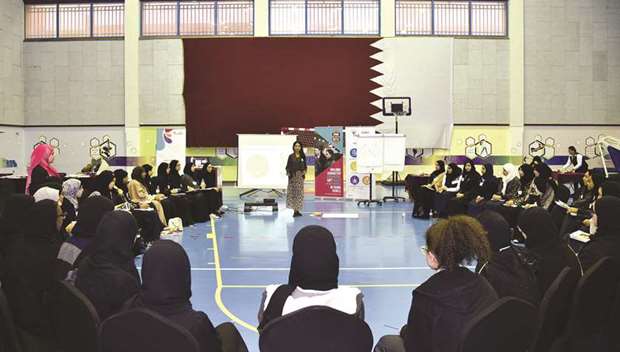But at the British Council, we are already planning for the new academic year and how we can improve the abilities and prospects of Qatar’s next generation.
Teachers will of course go about their work as normal in the country’s schools, but we expect to add something extra for hundreds of Qatari students through our life skills Taqaddam programme.
Taqaddam is unique, offering practical immersion in the “soft” skills which employers are increasingly demanding – problem solving, creativity, critical thinking, confidence, determination and teamwork.
It’s a model which supports Qatar’s ambitious vision for the future, building a knowledge-based economy to diversify away from dependence on oil and gas. The programme will reach 350 students in Qatar this year.
In recognition of the programme, Taqaddam was awarded second place at the International Business Excellence Awards in the corporate social responsibility category earlier this year. The programme aims to tackle a serious problem identified by businesses and policymakers in the region – a shortage of the skills needed to thrive in a 21st century jobs market where everything is changing and nothing is guaranteed, except change itself.
Young people leaving Qatar’s schools and universities in the next few years face challenges never seen before in employment. Artificial intelligence, robotic automation and 3D printing are part of a wave of new technology that will wipe out many of today’s jobs but create opportunities elsewhere.
A recent Oxford University study estimates that 47% of today’s jobs could be automated within 20 years. But the Cognizant Centre for the Future of Work (CFoW) believes that automation and AI will create 21mn new jobs worldwide. So there will be winners as well as losers.
Qatar has been preparing for this future for some years. Inviting some of the world’s top universities to base themselves in the country has been just one in a series of steps to improve education and create a future-ready workforce.
The Qatar Foundation’s new Careers Advising Service (CAS), launched in April, is the most recent initiative, aimed at matching young people with employment opportunities in a variety of industries.
The need for such programmes highlights the problems faced by the region’s recruiters. A new British Council report has surveyed more than 500 Gulf business leaders and discovered a severe shortage of the skills needed to prosper in this new world of work.
The survey was conducted in Dubai, where many multi-national corporations have regional headquarters. Almost without exception, business leaders said they need certain qualities in new recruits, but are currently not getting them.
The survey showed a high demand for STEM skills (Science, Technology, Engineering and Maths). But beyond that they also require flexible, practical and non-technical skills – the ability to solve complex problems, think critically and creatively, manage people and have the co-ordination skills to work well in a team.
The message is clear. When we don’t even know what new jobs will exist in 20 years’ time, the best insurance is having flexible skills to transfer from career to career.
Taqaddam, which means “moving forward” in Arabic, is currently offered in 13 Qatari schools to pupils aged 13-15. Volunteer teachers, 16 this year, are trained to oversee the course, a mix of online, workshop and classroom sessions lasting 12 weeks.
The online portal comes in a gaming-style familiar to teenagers, who must complete a series of missions on deadline, working together as teams.
Taqaddam has five pillars, which we see as important character traits for young people – Spark, Purpose, Confidence, Mettle and Positive Emotions.
Spark means having inspiration, creativity and passion. Purpose understands that life and activity is meaningful and worthwhile. Confidence requires belief in ourselves, while Mettle means showing resilience throughout all challenges. Positive Emotions encourages self-reflection and the management of feelings.
Taqaddam is designed by the Goodall Foundation, education experts from the UK who use self-sufficiency, collaboration and innovation to develop character in young people.
In Qatar, student numbers taking part have almost doubled in its three years of operation and in the coming year the programme will be translated into Arabic, allowing it to reach more pupils. Qatar’s Ministry of Education and Higher Education has even expressed interest in formally including Taqaddam in the national curriculum.
Every year the programme culminates in the Make It Happen event, a vibrant gathering of Taqaddam students. Their final task is to identify social problems in their own communities and come up with solutions.
Dozens of teams compete to attract the judges’ attention and a handful are chosen to ‘pitch’ their schemes to a demanding audience. Standing before their peers and a panel of questioning judges, they use every skill taught to them during Taqaddam.
There are winners, and prizes, but in reality everyone in the room is a winner, every year. Taqaddam graduates constantly describe how it has helped their confidence, developed their teamwork and taught the value of organisation.
These are the skills required in the workplace of tomorrow. We believe Taqaddam is helping Qatar develop the rich resource of its young people, allowing them to thrive and prosper in a world of change.

